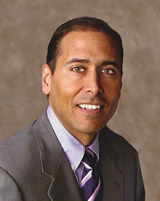17th Annual Summer Public Health Research Videoconference on Minority Health
Jeffrey A. Henderson, M.D., M.P.H.
President and CEO, Black Hills Center for American Indian Health
Assistant Professor, University of Colorado Denver Health Sciences Center

Jeffrey Henderson, MD, MPH, is a Lakota and enrolled member of the Cheyenne River Sioux Tribe of north-central South Dakota. After graduating from high school in rural western Wisconsin, he acquired both his Bachelor's (1985) and Medical (1989) degrees from the University of California, San Diego. After his 3-year residency in Internal Medicine at the University of Washington in Seattle, Dr. Henderson moved to Eagle Butte, South Dakota in 1992. There he served as Clinical Director of the Indian Health Service hospital and clinic for two years. He returned to school in 1994, again at the University of Washington, and received his Master of Public Health degree. He then moved to the Black Hills of South Dakota and worked for two more years at the Sioux San Indian Health Service hospital before joining the Strong Heart Study in 1998.
Also in 1998, Dr. Henderson founded the Black Hills Center for American Indian Health (BHCAIH), a community-based, non-profit organization whose mission is to enhance the wellness of American Indians through research, service, education, and philanthropy. Since receiving its first grant funding in the fall of 2001, BHCAIH has met with considerable success, garnering over $20 million through various NIH peer-reviewed health research and numerous peer-reviewed state and private foundation grants and contracts.
These highly collaborative efforts in addressing Native health inequities have had national impact. The results of the randomized clinical trial to prevent cardiovascular disease among high-risk American Indians, the Stop Atherosclerosis in Native Diabetics Study (SANDS), were published in the Journal of the American Medical Association (JAMA) in April 2008. Demonstrating that aggressive treatment of blood pressure and cholesterol can actually regress carotid atherosclerosis, the study provided compelling evidence that ultimately may lead to changes in the guidelines for managing type 2 diabetes. Across its research portfolio, the BHCAIH has recruited more than 8,000 American Indians into a variety of studies over the past 7 years. These efforts have promoted smoking cessation; better characterized cancer risk; examined environmental disparities; employed more than 50 Tribal members; and spent more than $4 million within impoverished reservation economies. The lessons learned are numerous and wide ranging; they underscore the importance of situating clinical practice within a community context.
In 2009, Dr. Henderson finished a 3-year term serving as Chair-designee on the Secretary's National Advisory Council for Minority Health and Health Disparities. He currently serves on the National Advisory Council for the Centers for Disease Control and Prevention's Breast and Cervical Cancer Early Detection Program. Dr. Henderson has also served as a reviewer for many different NIH and Agency for Healthcare Research and Quality funding initiatives.
Videoconference information
Return to the Videoconference home page
![]() Return to the Minority Health Project home page
Return to the Minority Health Project home page
Last updated: 3/25/2011 by Vic